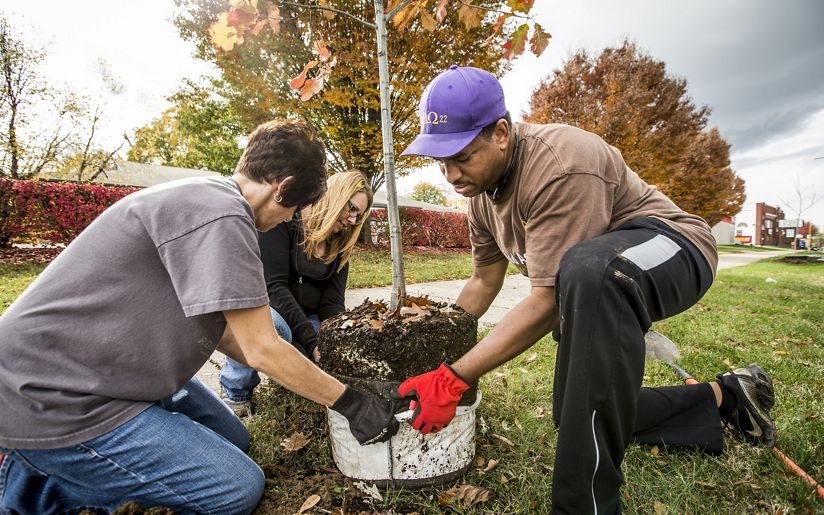- About
- Topics
- Picks
- Audio
- Story
- In-Depth
- Opinion
- News
- Donate
-
Signup for our newsletterOur Editors' Best Picks.Send
Read, Debate: Engage.
| February 03, 2016 | |
|---|---|
| topic: | Pollution |
| tags: | #carbon, #climate change, #compost, #organic |
| located: | USA |
| by: | Debra Atlas |
That carbon, now CO2 in our atmosphere, is growing at an alarming rate. Governments are beginning to recognize that climate change due to increased greenhouse gases in our atmosphere is a reality.
Soil is affected by climate change, says Stephen Andrews, an agronomist and Professor from U.C. Berkeley. The health of our soil has wide implications for the health of our planet.
In her book "The Soil can Save Us: How Scientists, Farmers and Foodies are Healing the Soil to Save the Planet", Kristin Ohlson said “With better care of our soil, it’s possible that our excess atmospheric carbon could be sequestered in the soil, bringing our atmosphere back into balance and reversing climate change.”
As Michael Pollan says in the film Soil Solutions to Climate Problems, “we now know how to put carbon back in the soil where it belongs.”
At last December'sParis climate talks, France’s Ministry of Agriculture, Agrifood and Forestry introduced the 4/1000 Initiative: Soils for Food Security and Climate, which aims to increase organic matter in soils by 4 parts per 1,000 (4 percent) per year. The plan calls for planting more trees, using compost and other natural soil amendments, and growing a variety of plants, in order to increase soil fertility and agricultural production and contribute to achieving the long-term objective of limiting the temperature increase to +1.5/2°C.
If every country reached this ambitious goal, we could store 75 percent of global greenhouse gas emissions.
Meeting the challenge of climate change will require a combination of solutions, says Robert Reed, Project Manager at San Francisco Bay area's Recology, an employee-owned company that provides landfill diversion and resource recovery services via collection, recovery and compost in four Western states.
“We no longer have the luxury to throw things away, to apply chemicals, to quickly green things up,” said Reed.
“We have a crisis of topsoil,” he said.
As early as 1938, the U.S. Department of Agriculture recognized this, publishing a bookasking cities to establish food scrap compost collection programs to send nutrients back to farms.
Recology owns and operates one of the largest, most advanced composting facilities in North America. Located near San Francisco, Jepson Prairie Organics Inc.turns approximately 650 tons of food scraps and plant cuttings into 10 large truckloads of finished compost daily.
Jepson is at the forefront of urban compost collection programs. Utilizing an 11-step process, they turn food scraps like banana peels, egg shells, chicken bones, veggie trimmings and pizza crust into beautiful finished compost in 60 days.
And Jepson's getting noticed.
In the last 18 months, nearly 200 French officials and journalists have toured the facility. So too have the Mayor of Rome, the Director for Environment from Netherlands, a top official from China, visitors from Scotland, Russia, Croatia, Central and South America, Spain and Canada.
“This is a powerful solution,” said Reed.
A single application of compost stimulates tremendous microbial activity, a key element in healthy soil. It drives stronger plant growth, generating larger leaves on plants. Plants can then achieve more photosynthesis, pulling carbon from the atmosphere and pushing it through plant roots into the soil.
Reed says farms and vineyards that buy Recology's compost pull carbon from the atmosphere and grow robust root structures.
Industrial agriculture is a major contributor to atmospheric carbon, he said. “When we make a shift to smaller farming based on healthy soils, regenerative microbial activity in those soils, we've turned a problem – industrial agriculture – into a solution, which is turning small farms into carbon sinks.”
“It's double positive in addressing climate change,” said Reed.
Composting facilities are critical infrastructure, he said. But many more are needed.
“(Many) cities want to institute curbside compost collection programs,” said Reed, “but they can't. They don't have any place they can take the materials. We need to plan, permit and build a lot more composting facilities like Jepson,” he said.
Sao Paolo, Brazil, with a population of nearly 20 million, has recognized the value and necessity of this. In the midst of severe drought, they're bringing people in from around the world to help plan and build a network of nine new compost facilities. They will then collect food scraps from around the city, bring it to those facilities, and get the compost onto farms.
“This will help the farms,” said Reed, “And help farms save tremendous amounts of water. This will leave water for people in the city to use.”
“Instead of having a problem of landfills emitting greenhouse gases, Reed said, “we can turn all this stuff into beautiful soil, get it onto farms and turn farms into carbon sinks!”
“You eliminate a problem and turn it into a solution,” said Reed.
By copying the embed code below, you agree to adhere to our republishing guidelines.
